商学部(塾外用) - 慶應義塾大学-塾生HP
商学部(塾外用) - 慶應義塾大学-塾生HP
商学部(塾外用) - 慶應義塾大学-塾生HP
Create successful ePaper yourself
Turn your PDF publications into a flip-book with our unique Google optimized e-Paper software.
Reference Books:<br />
・後藤一美「国際協力論序説―グローバル・ガバナンスの視点から」<br />
鈴木佑司・後藤一美(編著)『グローバリゼーションとグローバル・<br />
ガバナンス』、法政大学出版局、<br />
2009年。<br />
・後藤一美「日本の国際開発協力を問う」後藤一美・大野泉・渡辺<br />
利夫(編著)『日本の国際開発協力』、<br />
日本評論社、2005年。<br />
・後藤一美(監修)『国際協力用語集』、国際開発ジャー<br />
ナル社、2004年。<br />
・Kazumi Goto, "International Cooperation in the 21st Century: In Search<br />
of a Convivial Global Society", JBICI Review, No.8, Japan Bank for<br />
International Cooperation, November 2003.<br />
<br />
・ Vinay Bhargava (ed.), Global Issues for Global Citizens: An<br />
Introduction to Key Development Challenges, The World bank, 2006.<br />
・Nancy Birdsall and William R. Easterly, Reinventing Foreign Aid, The<br />
MIT Press, 2008.<br />
・John N. Clarke and Geoffrey Edwards (eds.), Global Governance in the<br />
Twenty-First Century (Global Issues), Palgrave MacMillan, 2004.<br />
・ John Degnbol-Martinussen and Poul Engberg-Pedersen, Aid:<br />
Understanding International Development Cooperation, Palgrave-<br />
Macmillan, 2003.<br />
・William Easterly, The White Man's Burden: Why the West's Efforts to<br />
Aid the Rest Have Done So Much Ill and So Little Good, Penguin, 2007.<br />
・Michael Edwards, Future Positive: International Cooperation in the 21st<br />
Century, Stylus Pub Llc, 2004.<br />
・Margaret P. Karns, Karen A. Mingst, International Organizations: The<br />
Politics and Processes of Global Governance, Lynne Rienner Pub, 2004.<br />
・Carol Lancaster, Foreign Aid: Diplomacy, Development, Domestic<br />
Policies, University of Chicago Press, 2006.<br />
・ David Leheny and Kay Warren (eds.), Japanese Aid and the<br />
Construction of Global Development: Inescapable Solutions (Routledge<br />
Contemporary Japan) , Routledge, 2009.<br />
・George Mavrotas and Mark McGillivray (eds.), Development Aid: A<br />
Fresh Look (Studies in Development Economics and Policy) , Palgrave<br />
Macmillan, 2009.<br />
・Frederic P. Miller, Agnes F. Vandome and John McBrewster (eds.),<br />
Development Aid, Alphascript Publishing, 2009.<br />
・Anthony Payne, Global Politics of Unequal Development, Palgrave<br />
Macmillan, 2005.<br />
・Report of the Secretary-General's High-level Panel, A More Secure<br />
World: Our Shared Responsibility, Department of Public Information,<br />
United Nations, 2004. <br />
・Report of the UN Secretary-General, In Larger Freedom: Towards<br />
Development, Security and Human Rights for All, United Nations, 2005.<br />
<br />
・Report of the UN Millennium Project (Jeffrey D. Sachs, Director),<br />
Investing in Development: A Practical Plan to Achieve the Millennium<br />
Development Goals, United Nations, 2005. <br />
・Jeffrey D. Sachs, The End Of Poverty: Economic Possibilities for Our<br />
time, The Earth Institute: Columbia UniversityPress, 2005.<br />
・Jeffrey D. Sachs, Common Wealth: Economics for a Crowded Planet,<br />
Penguin, 2009.<br />
・ Finn Tarp, Foreign Aid and Development: Lessons Learned and<br />
Directions for the Future (Routledge Studies in Development Economics),<br />
Routledge, 2000.<br />
・Shahid Yusuf, Angus Deaton, Kemal Dervis, William Easterly and<br />
Takatoshi Ito, Development Economics Through The Decades: A Critical<br />
Look at 30 Years of The World Development Report, World Bank, 2008.<br />
86<br />
LAW AND DEVELOPMENT 2credits (Fall)<br />
開発法学 2単位 (秋学期)<br />
Institutional Change through the Rule of Law Reform to Attain Good<br />
Governance<br />
Professor, Graduate School of Law School MATSUO, HIROSHI<br />
法務研究科(法科大学院)教授 松尾 弘<br />
Course Description:<br />
This course aims to provide with the basic knowledge of Law and<br />
Development from a practical as well as a theoretical aspect.<br />
Development can be regarded as a comprehensive institutional reform of a<br />
society, in which a number of informal rules have been binding and<br />
restricting the attitudes and behaviors of its members. However, it is<br />
sometimes difficult for societies to reform their institutions for themselves<br />
when they are heavily burdened by the conventions maintained by the<br />
strict regimes. As the international societies have been more and more<br />
globalizing, it is becoming duties for each society to assist others to<br />
undertake their institutional reform.<br />
Although it would be hard for us to expect the international societies to<br />
establish the world government, we should be able to keep our security by<br />
getting the global governance, which consists of the good governance of<br />
each state in the world. Good governance may be obtained through the<br />
institutional reform led by the good government, markets and firms, and<br />
civil societies, which are mutually assisted and assisting in their own<br />
functions. Law may be a strong measure to facilitate such an institutional<br />
reform to get good governance, and the legal assistance activities among<br />
nations should promote the global governance, which might be the only<br />
path to the international security and peace. In this context, we should<br />
explore the indicators of governance and the way by which developed<br />
countries can cooperate with developing countries to accomplish their<br />
legal reform that actually leads to development.<br />
Textbooks:<br />
There are no specific textbooks. Materials will be distributed as<br />
appropriate and relevant.<br />
Reference Books:<br />
・D. North, Institutions, Institutional Change and Economic Performance,<br />
Cambridge University Press, 1990.<br />
・J. Faundez (ed.), Good Government and Law: Legal and Institutional<br />
Reform in Developing Countries, MacMillan, 1997.<br />
・J. Faundez et al. (ed.), Governance, Development and Globalization,<br />
Blackstone Press, 2001.<br />
・松尾弘『良い統治と法の支配:開発法学の挑戦』(日本評論社,<br />
2009)[H. Matsuo, Good Governance and the Rule of Law: A Challenge<br />
of Law and Development, Nihon-hyoron-sha, 2009]<br />
THIRD WORLD DEVELOPMENT AND THE POOR 2credits<br />
(Fall)<br />
第三世界の開発と貧困 2単位 (秋学期)<br />
Lessons from the Developing World<br />
Lecturer BOCKMANN, DAVE<br />
講師 ボックマン, デイブ<br />
Course Description:<br />
This course is designed to increase the student’s awareness of thirdworld<br />
communities and the challenges they face in overcoming poverty.<br />
The U.N. Millennium Development Goals promise to end poverty by<br />
2015. The goals are lofty and costly, but will they actually help the poor?<br />
Based on the lecturer’s 30 years of community development experience in<br />
the U.S. and India, another approach, that of small locally based projects<br />
bringing real and immediate change to real people’s lives will be<br />
examined. In this course, students will learn about:<br />
• Self Help Groups (SHGs): How SHGs are organized and why. How<br />
the SHGs improve the financial stability of families and enhance the<br />
status of women.<br />
• Micro-Finance: How small loans, often times of less than $100, can<br />
move whole families out of poverty.<br />
• Appropriate Technology: How, when the poor themselves are<br />
involved, appropriate technologies can be successfully conceived,<br />
designed and implemented by developing communities. Learn some of the



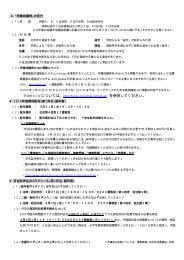
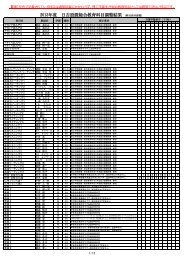
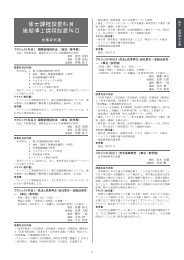
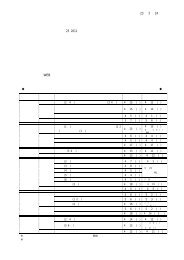

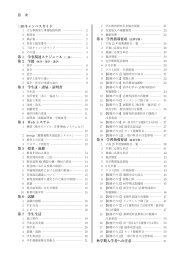



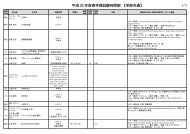

![文学部時間割表[2 ・3年生(07学則)]](https://img.yumpu.com/21046130/1/184x260/2-307.jpg?quality=85)

